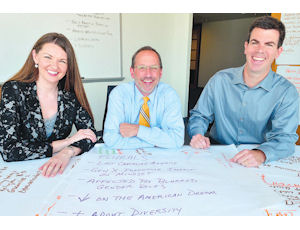Some of its members are still in diapers, but the high-stakes game of naming the next generation is already in full swing. Earlier this month, Sherman Oaks-based Magid Generational Strategies added its own name to the bevy of techy names already out there, calling the newest generation of teens, tweens and toddlers the pluralists. The name was inspired by the makeup of the group, the most diverse in American history, said Jack MacKenzie, executive vice president. Only 54 percent of plurals, who Magid defines as being born starting in 1997, are white, compared to 72 percent of baby boomers and 62 percent of Gen Xers. Magid says this is the last generation of a white majority in the U.S. Naming a generation has become a cottage industry of sorts and much publicity — and business success — can go to the person or company that chooses the name that best identifies a generation. Behind all the names — as well as the truncated generations — is certainly the desire to be the one to pick the best name. But whether the new moniker sticks is another story. Naming a generation is tricky business. Wide adoption is largely an accident of history, according to those who’ve picked some names that lasted and those that did not. With big media clients like CBS, The Walt Disney Co., Fox and Warner Bros., Magid certainly has a good shot at winning this name game. Since releasing it on April 30, the moniker has been picked up by media outlets ranging from MSNBC to National Public Radio station KPCC and USA Today. But it can take a decade or more for a single name to emerge as the clear winner identifying a generation. Millennials was first coined by Neil Howe and William Strauss in the seminal book “Generations: The History of America’s Future,” published in 1992. But it took more than another decade for the name to crystallize and replace a host of other monikers like gen Y, a term of ad industry magazine Advertising Age, Howe said. “We came up with the name when the millennials were just seven or eight,” Howe said. “There wasn’t a consensus around the name until the group was 15 to 20 years old.” Howe did not have as much success with other names. He first called what eventually came to be known as gen X the 13th generation. He got a book from it, but not much else. Millennials was obviously much more successful, and Howe and Strauss were able to turn their academic research on this cohort into a publishing and consulting success story with eight titles about millennials. The company they started, LifeCourse Associates, has dozens of big-name clients from Best Buy to Motorola and MTV, along with numerous colleges and universities. No doubt Magid is aiming for similar success with pluralists. “A big goal here is to position our clients as thought leaders,” said Sharalyn Hartwell, executive director of Magid Generational Strategies. Of course, if Magid’s clients look smart and in step with society, so does Magid, which is good for all. This is Magid’s first stab at labeling a generation. The company got into the generation research business with the launch of ABC Family in 2003. The newly acquired Disney property wanted to better understand the teen landscape and the work was influential in creating shows like the “Secret Life of An American Teenager.” MacKenzie’s team liked the term “millennials,” so they saw no reason to reinvent the wheel. Three years ago, however, they started to notice a new generation emerge. Raised by Gen X parents rather than the more positive baby boomers, plurals’ defining moment was the financial meltdown of 2007 and the Great Recession. It has made this generation “more realistic, pragmatic and individually success-driven,” than their millennial counterparts, MacKenzie said. MacKenzie’s team conducted 50 qualitative studies and completed some 150,000 interviews and surveys to understand the pluralists. They also created an online panel of 10,000 households to answer questions and submit video diaries. As the team wound down its work, it became clear that existing monikers, such as iGen, that focused on this generation’s tendency to text, Skype and Facebook were not adequately descriptive. “We’ve never had a locomotive generation, or a radio generation,” MacKenzie said. Magid is already using the work with clients to help them refine their advertising and programming agendas. Disney, for example, is likely to use the insight about pluralists to create characters that are a bit more edgy, realistic or serious than millennial characters. “They have to understand these kids are different,” MacKenzie said. “The unbridled optimism of the millennials no longer exists.”
